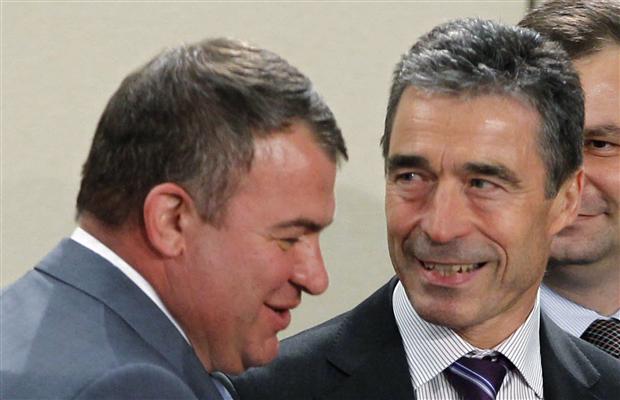
Moscow’s BMD Cooperation Demands Do Not Seem Serious
Publication: Eurasia Daily Monitor Volume: 8 Issue: 111
By:

This week in Brussels, during a meeting of the NATO-Russia Council (NRC), Russian Defense Minister Anatoliy Serdyukov discussed with his Western counterparts the seemingly intractable problem of Moscow’s opposition to US-NATO plans for ballistic missile defense (BMD) in Europe. Serdyukov stated there was no progress: “We did not receive any positive or perceptible responses. NATO still does not hear Russia’s proposals on [joint] BMD.” Russia is demanding guarantees that the EuroBMD cannot be used to intercept Russian intercontinental ballistic missiles (ICBMs). According to Serdyukov, “By the year 2020, a BMD system may be built in Europe that will negate the Russian strategic potential and Russia will begin a new arms race to build capabilities to overcome this BMD system.” Serdyukov balanced his harsh statements by emphasizing the “very active” development of Russo-NATO cooperation in other fields. Serdyukov announced that Moscow “does not dramatize the situation” and will continue to negotiate in the framework of the NRC and bilaterally (ITAR-TASS, Interfax, June 8).
Russian efforts to thwart NATO’s plans have been two-pronged: to offer a so called “segment” joint EuroBMD system in which the Russian military would be in charge of defending the European continent from missile attack from the East and Southeast; at the same time the West must agree to sign a comprehensive treaty to guarantee the planned EuroBMD could not be aimed at Russia. In recent weeks some concrete details of the Russian proposals have been made public.
At a public conference the Russian top brass led by the Chief of the General Staff and First Deputy Defense Minister Army-General Nikolai Makarov denounced as “unsubstantiated” Washington’s assurances that the planned BMD system in Europe is not aimed at Russia. Makarov demanded that Russia must take part in the planning and development of any EuroBMD, along with a substantial exchange of BMD technologies with the West, forming a joint “information center” to share data about missile launches and a joint command center to order the launch of interceptors if there is a missile attack on Europe (RIA Novosti, May 20).
The Chief of the Operational Directorate of the General Staff, Lieutenant-General Andrei Tretyak, promised that within the framework of a joint EuroBMD Russia may promise to shoot down missiles aimed at neighboring European nations and provide early warning information. According to Tretyak, by relying on Russian interceptors and early warning, Western nations could save money by not developing their own. The deputy chief of staff of the Space Troops Colonel Igor Morozov described the assets Russia may pile into a possible joint BMD system: a satellite-based and land radar-based early warning system, as well as “100 percent effective interceptors” of the A-135 BMD system guarding Moscow. In addition, the Russian defense industry is “developing a new nonnuclear mobile space defense and BMD complex that would select follow and intercept ballistic targets” (RIA Novosti, May 20; VPK June 1).
Tretyak declared the General Staff has determined, based on the findings of its intelligence and research divisions that after 2015 enhanced versions of US SM-3 interceptors on navy ships and in Poland will threaten Russian ICBMs. Tretyak outlined additional demands, “without which it is impossible to cooperate effectively” – the West must strictly limit the number, speed, range and the location of the deployment of its BMD interceptors as well as radars. Later, Deputy Defense Minister, Anatoliy Antonov, told the press that Moscow is demanding “a special treaty that would legally bind any EuroBMD” – the number of interceptors must be limited, flying at slow speed to be able to kill only short and medium range missiles, and they must be based far away from Russian borders. Defense ministry officials stated that BMD interceptors in Poland are unacceptable (Kommersant, June 6).
The A-135 BMD system defending Moscow today has operational high-speed low-altitude PRS-1 interceptors as well as a functioning command and control center and high resolution all-directional Don-2N radar. The previously deployed high-altitude (600 km) and long-range (800 km) out of atmosphere A-925 interceptors have been scrapped. The silo-based PRS-1 carries, as did the A-925, megaton nuclear warheads (Vozdushno Kosmicheskaya Oborona, March-April, 2011).
The former Director General of Almaz-Antey design bureau, Igor Ashurbeili (who resigned last February) told Jamestown that during the Cold War an attempt was made, later abandoned, to build an S-225 interceptor to directly hit and kill targets as the US SM-3 does. Now the S-500 system is being developed to intercept aircraft, low orbit satellites and ballistic missiles. According to Ashurbeili, for BMD proposes nuclear warheads will be “mostly” used, since these may blast out “the entire cloud of incoming warheads with no need to determine true threats from dummies.” The recently adopted state armament program has plans to deploy by 2020 “some 100 S-500 complexes to cover the nation’s industrial and political centers, as well as the perimeter of its borders” (VPK, March 2). The S-500 may turn out to be a potent BMD system, but hardly any European nation would contract it to defeat incoming rogue missiles with multiple nuclear blasts in European skies.
The apparent lack of any expertise in developing workable hit-to-kill BMD seems to effectively exclude the possibility of any viable “new non-nuclear mobile BMD” complex that may appear in Russia anytime soon. The Russian military do not seem to believe hit-to-kill BMD will ever truly work. The commander of the Strategic Rocket Forces, Lieutenant-General Sergei Karakaev last month told journalists the newest Russian ICBM RS-24 Yars is designed to effectively penetrate any possible future US BMD system (ITAR-TASS, Interfax, May 17).
The constructor-general of ICBMs SS-25 Topol, SS-27 Topol-M, RS-24 Yars and the sea based missile SS-NX-30 Bulava, Yuri Solomonov, has publicly stated that previous US plans to deploy BMD interceptors in Poland, a radar in the Czech Republic as well as the present campaign to build EuroBMD “do not and cannot threaten Russia’s ICBMs in any way.” Solomonov described the proposed joint “sectoral BMD” in Europe as a “dead-end and absolutely unfeasible” (VPK, March 2).
The Russian General Staff seems to be playing the old Cold War game of inventing a nonexistent BMD threat and putting forward deliberately unacceptable “peaceful proposals” to create an impossible and unacceptable “joint BMD.” The inevitable negative Western response may be used as a pretext to begin some “arms race” and boost the defense budget, but unlike the Cold War era, in today’s Russia most of the funding will surely be privatized and misappropriated. That is historic progress: producing billionaires instead of megatons.




